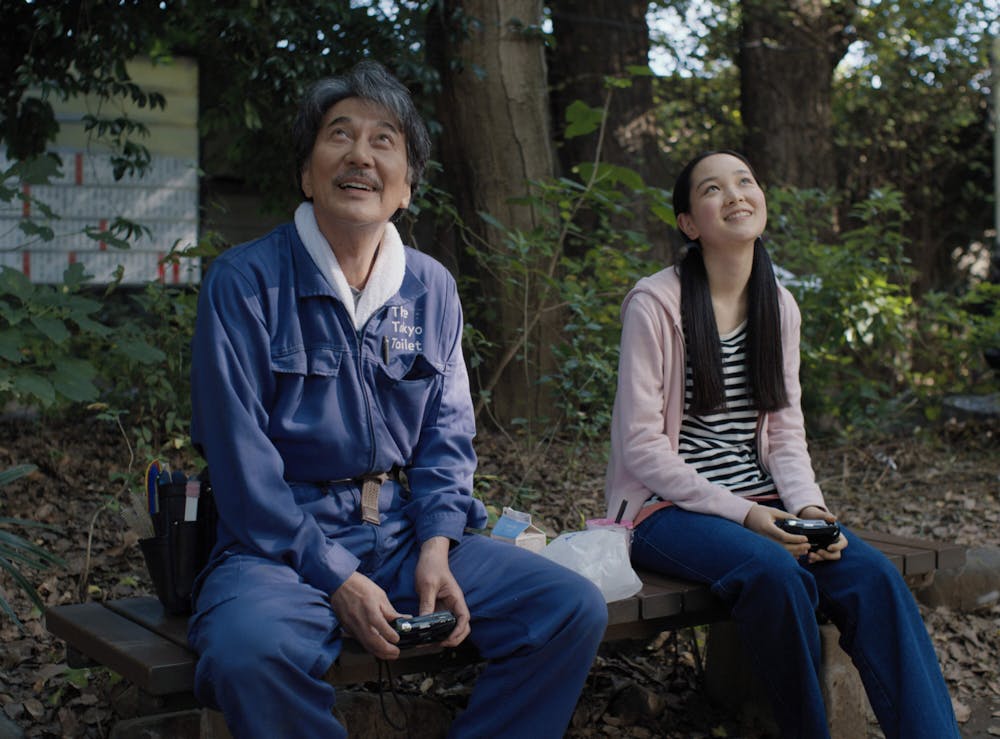Not much happens in Wim Wenders’s “Perfect Days.” The film follows Hirayama (Kōji Yakusho), a toilet cleaner in Tokyo living a largely solitary life. Hirayama does very few things each day. All of them are simple, but that’s not to say they’re not important. Running only on Hirayama’s relaxed routine, “Perfect Days” avoids gimmicks and action, instead committing to its message: find the beauty and joy in the smallest, most natural parts of life.
Yakusho’s performance of Hirayama is just as mesmerizing as the beauty around him, even if his routine may seem mundane to most people. He wakes up, folds his blankets and gently sprays his plants before leaving for work. He meticulously cleans each public toilet, holding up mirrors to check the sparkle on the bathroom metals and porcelain. The owners of the restaurants he goes to know his order by heart. Yakusho excels in making each of these moments larger than they seem. Each morning, after the blankets and the plants, Hirayama stands in his doorway and takes a deep breath, taking in the world he’s come to love. Yakusho’s smile is slight yet hard to miss. His roaming gaze and slow focus all contribute to a rare form of positivity in today’s hypercritical era.
As the film builds to its climax, though, we can see the pain Hirayama has tried to bury with his routine. His smiles gain a hint of pain; his eyes constantly glimmer with tears. As he watches his estranged sister (Yumi Asō) and niece drive away and out of his life, Hirayama fully breaks into tears. Through Hirayama’s pain, Wenders delivers a familiar, yet important reminder: Keep going.
An essential part of his daily routine, Hirayama chooses a different cassette tape to play on his drives to work (Lou Reed’s “Perfect Day” is where the film’s title comes from). Some are quite sad (like Patti Smith’s “Redondo Beach”), some are happier (Nina Simone’s “Feeling Good,” Van Morrison’s “Brown Eyed Girl”), but most will evoke some sort of memory for those listening. Hirayama, like many of us, plays these songs to set the mood for his morning or recap his feelings at the end of it. Even as he cries to the saddest of these songs, Hirayama keeps driving. There’s no doubt he’ll be watering his plants and taking photos the next morning.
Wenders is no stranger to the aesthetic, ethereal, poetic film (one of his most well-known works is the 1987 film “Wings of Desire”), a fact that’s clear from Wenders’s precision and dedication to slow moments. Since the rise of TikTok and the subsequent “Gen Z has no attention span” discussions, many movies have struggled with how to balance practiced pacing and attracting younger audiences. It might be easy to say Wenders’s 2024 film was simply made for an older audience, but I find that hard to believe. “Perfect Days” focuses on how we capture life’s joys just as much as it tells us what they may be. And, as antithetical phones are to the film’s premise, young adults and teenagers have grown up perfecting the art of capturing moments. You could even say we have the whole world, past and present, in our back pockets.
Wenders capitalizes on this opportunity to speak to viewers of all generations. Hirayama and his niece Niko (Arisa Nakano) use the exact same film camera, hers being a gift from him. She watches him take photos of the trees, mirroring his actions. Yet Niko takes videos with her phone as well, notably of her uncle cleaning, representing a modern form of the same appreciation. There’s something delightful about a physical form of memory in the film — a cassette tape or a printed photo, for example — but what’s most important is noticing everything around us, moving with life’s ebbs and flows rather than trying to shape it ourselves.
“Perfect Days” is innovative for its time. Very few words are spoken (many are sung), but Wenders’s intent is clear and well executed. If you were born in the 2000s, chances are you’ve been told to put the phone down and appreciate your life. “Perfect Days” has the same message, but gentler. Wenders asks us to stop and smell the roses, for lack of a better phrase. Take a look around, snap a photo or two and sing along to the music of life.
Gabriella is a junior from Los Angeles, concentrating in English, Modern Culture and Media, and Literary Arts. If she’s not at the movies, you can find her coaching the Dodgers from her dorm, plotting her future Big Brother win, or perfecting her chocolate chip cookie recipe.





